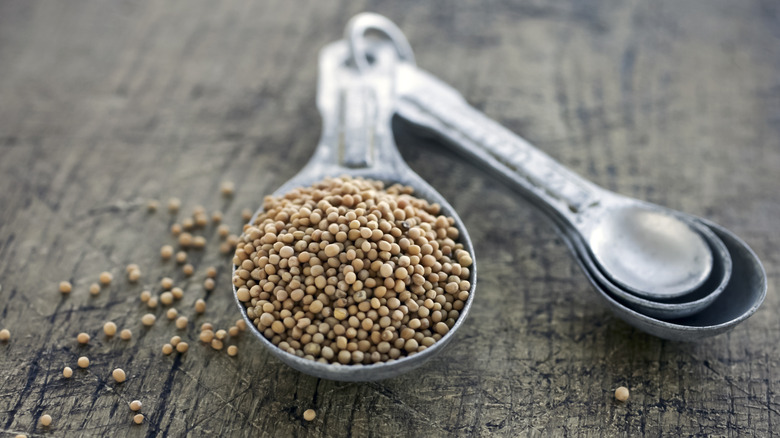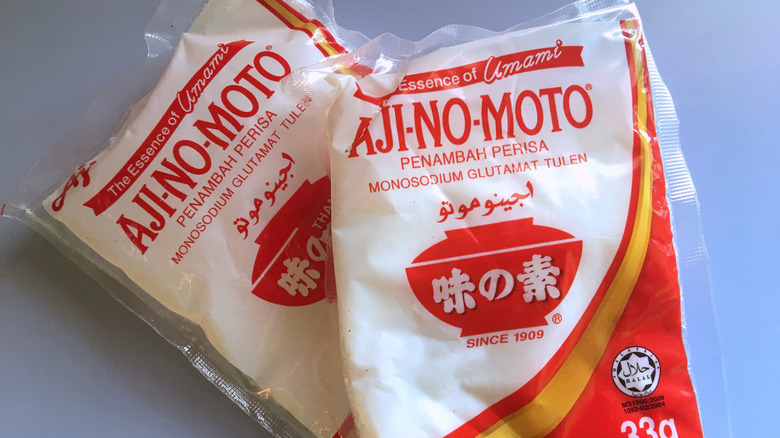Why Mustard Oil Is Illegal In The United States
Mustard oil is a key ingredient for a number of cuisines: North Indian and Bengali recipes call for it in all sorts of dishes like butter chicken and alur dom (curried potato), and it also crops up in Chinese and Russian dishes. Yet this ingredient is illegal in the U.S., Canada, and EU countries because of (possibly unfounded) fears around one of its components.
Specifically, a fatty acid called erucic acid is the reason for the ban in the U.S. and other countries. It's not unique to mustard oil: It occurs in numerous plants from the brassica family, which also includes very legal vegetables like kale, cabbage, Brussels sprouts, and mustard greens. Agencies like the Food and Drug Administration (FDA) accept erucic acid in lower amounts in food (there's a threshold for what's considered a safe level of it). But the higher concentration of it in mustard oil — which is made by crushing or grinding mustard seeds — is why authorities targeted it in these countries.
Erucic acid has been linked to a potential increase in deposits of fat in the heart muscles of some animals like rats and chickens. However, even though limits were placed on foods with erucic acid as long ago as the '70s in Europe, there's still no scientific confirmation that it can hurt humans. Plus, studies on people who consume a lot of erucic acid in places like China haven't offered the same results as with animals.
A questionable ban?
It seems that the ban on mustard oil stems from agencies like the FDA being ultra cautious, rather than from any firm proof that erucic acid is harmful to humans — after all, mustard oil (and by extension, erucic acid) is common in diets in other part of the world. In Europe, food safety agencies have stated that the likelihood of erucic acid harming adults was more or less nonexistent, but have continued to express some concern that toddlers consuming larger volumes could have negative reactions to it, although in a very small number of cases.
The ban on mustard oil has been criticized by some academics and others as overbearing, considering that there has been no research demonstrating it as harmful to humans. In particular, because it's used specifically in a number of non-Western cuisines (and especially some regional Indian cuisines), the ban could be seen as stigmatizing those cuisines and by extension, the people who cook with mustard oil — a little like the way MSG (or monosodium glutamate) was seen as an undesirable ingredient in Chinese food, even though it was later proven to be totally safe for human consumption. Notably, mustard oil also has health benefits: It's anti-inflammatory and high in healthy fatty acids like omega-3 and omega-6. However, the ban overshadows these potential positives.
You can still buy mustard oil in the U.S.
To be more precise, mustard oil isn't totally illegal in the U.S.: It's actually just illegal to sell it as food. That's led to a workaround where mustard oil can be sold if it's intended to be used for a massage oil, or to be applied to the skin or hair. These mustard oils legally have to be labeled with the words "for external use only," although some home cooks reportedly use them for cooking purposes — and the idea that some people are cooking with a product that's marked "for external use only" likely doesn't help with the stigma around mustard oil.
However, if you want to cook with mustard oil and get the distinctive horseradish-like kick that it can add to food, the situation is slowly changing. There's now at least one brand of mustard oil available in the U.S., called Yandilla. It's made using a mustard plant that's cultivated to have lower levels of erucic acid in it, so it has been approved by the FDA.


